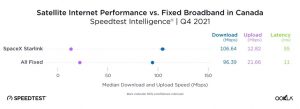
SEATTLE — After seeing its median download speed decrease during Q3 2021, SpaceX’s low Earth orbit satellite communications service Starlink achieved a milestone 106.64 Mbps median download speed in Q4 2021, according to Seattle-based broadband and mobile network testing company Ookla.
In a new report released today, Ookla says Starlink’s download speed increase in the fourth quarter (up from 84.55 Mbps in Q3 2021) made the service faster than overall fixed broadband service in Canada, which achieved a median download speed of 96.39 Mbps in Q4 2021 (up from 90.67 Mbps in Q3).
However, Starlink’s median upload speed continued to be slower than fixed broadband in Canada — 12.82 Mbps vs. 21.66 Mbps — and “latency on Starlink was still much higher (55 ms vs. 11 ms),” the report says. (Please see chart below.)
“Starlink should be considered a viable option compared to fixed broadband in Canada, especially for rural consumers or those without access to fast fixed broadband options like fiber,” the report reads.
Using Speedtest data, Ookla was able to analyze Starlink’s performance in all 10 provinces of Canada during Q4 2021 (please see chart above), “all of which showed substantial increases in Starlink’s download speed during Q4 2021 compared to Q3 2021,” the report says.
Starlink’s median download speed was faster than the median download for all fixed broadband in seven provinces during Q4 2021, including: Manitoba (101.66 Mbps vs. 83.06 Mbps), Newfoundland and Labrador (195.30 Mbps vs. 131.58 Mbps), Nova Scotia (143.52 Mbps vs. 121.57 Mbps), Ontario (106.24 Mbps vs. 95.06 Mbps), Prince Edward Island (139.11 Mbps vs. 75.95 Mbps), Quebec (123.50 Mbps vs. 84.50 Mbps), and Saskatchewan (116.24 Mbps vs. 68.43 Mbps).
“Download speeds were comparable between Starlink and overall fixed broadband in New Brunswick (130.67 Mbps vs. 132.65 Mbps), and overall fixed broadband was faster than Starlink in Alberta (107.32 Mbps vs. 96.56 Mbps) and British Columbia (130.97 Mbps vs. 94.74 Mbps) — with the latter two provinces having better access to fiber-to-the-home (FTTH),” the report says.

For the full report, please click here.
Images borrowed from Ookla’s report.


